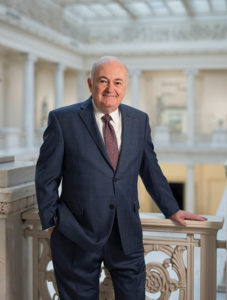 Photo: Joshua Franzos
Photo: Joshua FranzosDippy’s international star status was all the doing of Andrew Carnegie, of course. He was so proud of the discovery he had financed that he had his museum staff create nine full-size replicas of the fossil and sent them to nine capital cities around the world. London’s Dippy was the first—a gift from Andrew Carnegie to King Edward VII.
Starting with the first Carnegie International in 1896, Andrew Carnegie sought to make the world a smaller, more accessible, and better place through the cross-cultural exchange of both art and science.
But Carnegie was motivated by more than mere pride. Starting with the first Carnegie International in 1896, Andrew Carnegie sought to make the world a smaller, more accessible, and better place through the cross-cultural exchange of both art and science. Well over a century later, his Pittsburgh museums are still guided by that same aspiration.
On September 24, we celebrated the opening of the 58th Carnegie International, which reflects an even wider global reach than any of its predecessors. This was my first time witnessing the truly awe-inspiring work that goes into bringing the world to Pittsburgh for an International exhibition. On top of all the logistical complications of contacting artists and transporting their works across oceans and boundaries, the Museum of Art curators this time faced the additional challenge of a world-wide pandemic!
Bringing the world together through art and science has never been more urgent. Among his many interests, Carnegie was a passionate advocate for international peace, as demonstrated by his building the Peace Palace in The Hague, which is now the home of the International Court of Justice. His vision was shattered by the outbreak of the First World War, and too many wars have followed since then.
This year, serendipity again brought both the Carnegie International and Diplodocus carnegii into the international spotlight—a fitting conjunction, as both remain beacons of the role that art and science can play in fostering international understanding and reminding us of our shared humanity.
Steven Knapp
President and Chief Executive Officer,
Carnegie Museums of Pittsburgh
Receive more stories in your email
Sign up